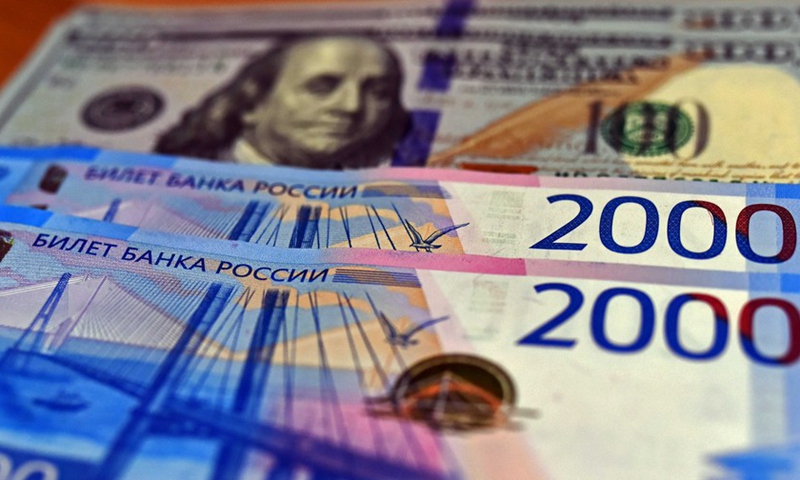Opinion: US-led Western financial sanctions will not shake the entire Russian economy

Russian ruble banknotes are seen with the US dollars in the backdrop on March 2, 2021. Photo: Xinhua
Click here to stay tuned with our live updates on Ukraine tensions.The US and the EU have decided to remove certain Russian banks from the Society for Worldwide Interbank Financial Telecommunication (SWIFT), drawing widespread attention in China. Remarks from some Chinese nationals in Russia about their inability to use Apple Pay and Google Pay at stores in the country and the panic among some Russian companies, in this age of internet and social media, have been grossly amplified and have even caused panic. Some enterprises have started to worry about the potential impact on their business with Russia.
However, as long as we look at it objectively and calmly, it is not hard to find that although this move will inevitably cause many troubles for the Russian economy, as a whole, it is not enough to shake the entire economy of the country. Even as they try to use or expand financial sanctions, the US and its European allies will also definitely be wary of the broad and unintended consequences of such a move.
It is not an exaggeration to describe an expulsion from SWIFT as the "nuclear option" of financial sanctions because that would cause enormous damage on the targeted financial institution or country. How? Trade cannot be conducted without a safe, convenient, efficient and low-cost payment and settlement system. While the US dollar is currently the most widely used international currency, SWIFT is the most important, safest and most convenient international interbank financial information transmission platform. It connects more than 11,000 financial institutions from over 200 countries and regions. It transmits 1.8 billion messages each year and handles about $6 trillion worth of transactions a day. It is also linked to the US' Clearing House Interbank Payments System (CHIPS). Under these circumstances, being kicked out of the SWIFT system means being ostracized from the global trade system.
As SWIFT is based in Belgium, it has the obligation to comply with local laws. Meanwhile, CHIPS guarantees the traceability of the US dollar and the control on global settlements. With other measures and mechanisms, the US actually has great control over the SWIFT system and has access to real time transaction information. This has provided the US with the favorable conditions to order the SWIFT system to comply with its "long-arm jurisdiction" policies.
Under the deterrence of US financial hegemony, the vast majority of financial institutions around the world have no option but comply with the US' "long-arm jurisdiction" policies and freeze the assets of those targeted by sanctions. In most cases, once the US adopts certain sanctions on the financial system, it can block the targeted country from access to the international dollar system and inflict damage on the its international financing and trade.
The US Department of the Treasury's Office of Foreign Assets Control (OFAC) can cause massive damage through six lists of financial sanctions: the Specially Designated Nationals and Blocked Persons List (SDNs), the Sectoral Sanctions Identifications List (SSIL), the Foreign Sanctions Evaders List, the NON-SDN Palestinian Legislative Council List, the Non-SDN Iran Sanctions Act List and the List of Foreign Financial Institutions Subject to Part 561 List. Among them, the most consequential two for Russia could be the SDNs and the SSIL.
However, the following factors will greatly limit the potential damage of the sanction on Russia.
First, the damage received by being kicked out of the SWIFT system depends on whether there are alternative financial information and payment settlement systems. If there are none, then, being banned from SWIFT would be a catastrophe for any country that needs to conduct modern transactions. If there are alternatives, they can help offset the blow from an expulsion from SWIFT. If the alternative systems are functional and efficient, and if the use of SWIFT as a sanction is extremely abused, a major power being kicked out of the system may actually be an opportunity for the alternatives to develop faster.
In this regard, even Iran, which is considerably small compared with Russia, has set up its own system know as the STFI after being kicked out of SWIFT. In 2012, all Iranian banks were cut off from SWIFT and switched to the regional settlement system known as SUCRE. Germany, France and the UK also set up a mechanism known as the INSTEX for trade with Iran. Russia already has a series of alternatives to choose, even if it is completely kicked out of SWIFT.
In 2012, Russia launched its own financial information transmission system known as the SPFS. Through lower costs and robust domestic promotion, the system has expanded to member countries of the Eurasia Economic Union and is expected to further grow. As of October, 2018, SPFS had 413 clients, including the Bank of China, and over the past four years the network has also further expanded. Additionally, to protect the assets of Russia from being frozen, the country also set up its own national payment system.
In October 2015, China launched its own Cross-Border Interbank Payment System (CIPS) for cross-border yuan settlement between Chinese and overseas financial institutions. As of December 2020, CIPS has a total of 1,092 partners, with 806 in Asia, 143 in Europe, 39 in Africa, 26 in North America, 19 in Oceania and 17 in South America.
In 2017, the China Foreign Exchange Trading System (CFETS) launched a payment-versus-payment (PVP) system for Chinese yuan and Russian ruble transactions, which has been running for five years and has become relatively mature. In addition, for companies engaged in cross-border e-commerce, especially small and medium-sized enterprises, online payment services provided by the Harbin Bank are considerable convenient.
Meanwhile, since 2014, Russia has been stepping up its de-dollarization process, including impressive progress in de-dollarization in China-Russia trade. In 2020, yuan settlements in China-Russia trade accounted for 44.92 percent, while dollar settlements only reached 14.42 percent. In addition, the yuan's proportion in Russia's foreign currency reserves has increased significantly over the recent years. As of March 2020, the yuan's proportion in the Russian Central Bank's foreign currency reserves reached 12.2 percent, the third-largest, and will increase to 15 percent, Russia's Ministry of Finance announced in February 2021.
Given such circumstances, the US-led Western expulsion of certain Russian banks from SWIFT will only have a limited impact. Moreover, in the long run, the deployment of this "nuclear option" of financial sanctions against Russia will further drive other countries to accelerate the creation of financial information and payment settlement systems independent of SWIFT.
The author is a research fellow at the Chinese Academy of International Trade and Economic Cooperation of China's Ministry of Commerce. bizopinion@globaltimes.com.cn



